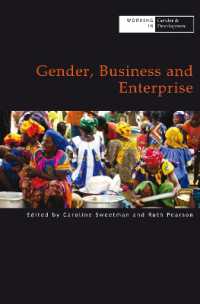Full Description
The Handbook of Research on Reading Comprehension is the seminal research handbook on reading comprehension. The third edition is an edited comprehensive compilation that summarizes the body of research on reading comprehension, building on the research of the first and second editions.
The purpose of the third edition is to provide a resource to:
• Summarize the theory, methods, instruction, assessment, landmark studies, recent advances, and trends in reading comprehension research
• Provide a comprehensive reference for a broad spectrum of stakeholders including scholars, educators, leaders, policy makers, and the general public on matters that influence and directing affecting the educational goals relative to literacy achievement
• Guide mentors and doctoral candidates seeking doctoral-level preparation in the area of reading comprehension research
• Make available the developments in reading comprehension from a global perspective by focusing on international researchers and populations
• Highlight cutting edge technological trends and implications
• Guide leaders toward decision-making grounded in scientific structures and research
• Focus on equity issues as it relates to the domain of reading comprehension situated within the context of cultural demands in today's society
Noteworthy Features in the Third Edition: The handbook consists of the following unique features:
• Comprehensive Overview: Each chapter provides a review of the research base in an area of reading comprehension research, as well as the historical and theoretical perspectives inherent to the topic with authors emphasizing the landmark studies that have been published since the second edition.
• Contributor Expertise: Each chapter author is the leading expert in the area of expertise on the topic, bringing extensive breadth and depth to the topic covering all aspects of the domain.
• Chapter Structure: Each chapter will include similar organizational features, which focus on the overall outline of the chapter and questions the chapter will address, a summary of the research, significant contributions, recent advances, guiding principles relevant to the domain, a summary of instructional interventions, and applications for future research. New chapter features will attend to technology, methodology, policy applications, and international scholarship.
• Questions for Discussion: New to the third edition is the contribution of 2-4 guiding questions that share the breadth and depth of the primary focus of the chapter's contents. Guiding questions can be used to stimulate deeper conversation in school professional development groups, as well as classroom and study groups.
• Technology Links: Each chapter author identifies technological advancements both on and offline, as well as include any relevant digital resources that readers can readily access. This new feature is to provide an interactive platform with the author and the readers.
This is an essential reference volume for the international community of researchers, scholars, educators, graduate students, and professionals working in the area of reading and literacy.
Contents
Part 1: FOUNDATIONS: Ways of Knowing and Doing 1. Introduction: Examining Comprehension Through New Lenses 2. The Roots of Reading Comprehension Instruction 3. Professional Development in an Era of Literacy Mandates: Teaching Comprehension in the U.S. and in the World Part 2: Theoretical Perspectives 4. Advancing an Equity-Oriented, Sociocultural Account of Reading Comprehension 5. Understanding the Nature of Reading Comprehension: Viewing Comprehension as a Multifaceted Phenomenon 6. Reading Comprehension as Social Practices in Social Events 7. Theoretical Transformations in Comprehension: Reflections on the Past and Visions for the Future Part 3: DEVELOPMENTAL IMPACT 8. The Role of Oral Language and Knowledge Development In Supporting Text Comprehension in Young Children 9. Using Assessment to Map and Evaluate the Comprehension Development of Young Children 10. Choosing Text for Comprehension: Considerations of Text Content, Relevance, Quality, and Text Content 11. Reading Fluency and Comprehension Development 12. Vocabulary and Comprehension: More Than a Simple Equation Part 4: TEXT PROCESSING AND KNOWLEDGE ACQUISITION 13. The Connection Between Reading Comprehension and Written Composition: Theory and Evidence 14. The Knowledge-Comprehension Connection: Activating, Building, And Revising Knowledge During Reading 15. More than Words: Examining Reading Comprehension as an Act of Communication 16. Self-Regulation with Agency: A Path Less Traveled Part 5: DIGITAL TEXT COMPREHENSION AND STRATEGIES 17. Background Research on Historical, Social, and Cultural Factors Shaping Students Reading Comprehension of Digital, Multimodal Texts 18. Constructing Meaning through Discussion On-line and Off-line 19. Research on Informational and Digital Text Comprehension Part 6: CULTURE, EQUITY, AND ENGAGEMENT 20. Reading Comprehension Research from an Intersectional Lens: Examining the Knowledge Based in the Context of Race Language and Disability 21. Family Literacy and Reading Comprehension: What We Know and What We Need to Know 22. Linguistic Influences in Reading Comprehension for Multilingual Learners 23. Racial Literacies and Comprehension: Readers, Histories, Contexts, Texts, Practices, Assessments, and Intersubjective Meanings before/since/beyond 21st Century Race Customs of the USA Part 7: FUTURE DIRECTIONS 24. Public Policy in an Era of Pandemic Response and Recovery, The Science of Reading, and Federal Funding Cuts: A Focus on Reading Comprehension 25. Where to From Here?






